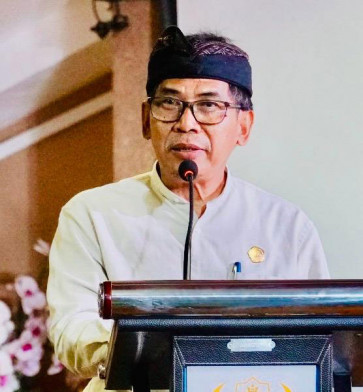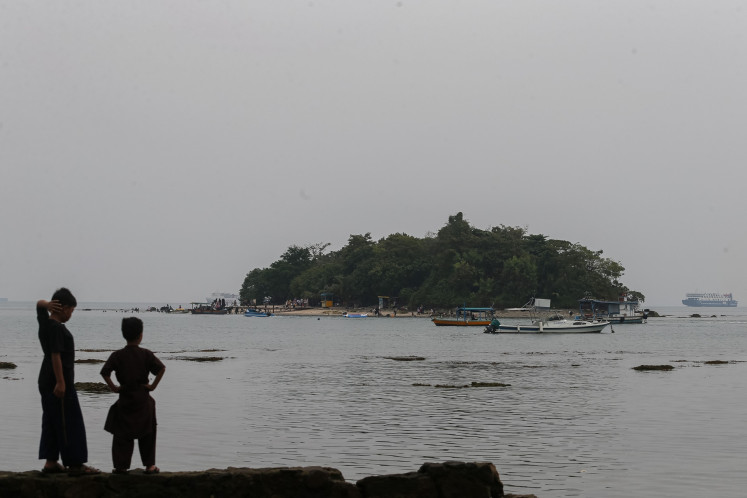Popular Reads
Top Results
Can't find what you're looking for?
View all search resultsPopular Reads
Top Results
Can't find what you're looking for?
View all search resultsEssay: Communalism and individualism in literary criticism
Literature is often based on the reality of a writer and reflects the culture, society, values and aspirations of a community
Change text size
Gift Premium Articles
to Anyone

L
iterature is often based on the reality of a writer and reflects the culture, society, values and aspirations of a community. Literary appraisal also includes the evaluation of the methods used by the author and the objective of such work — based on social norms and the individual perception of the topics and themes under discussion. Indonesia’s rich cultural heritage is incorporated in its literature, which includes discussions on individualism and communalism.
A common thread of tension between the individualistic and the strong collective voice are evident across all literary critiques of Indonesian literature. On the one hand, critics maintain the importance of retaining the social structure and maintaining the prevailing sociocultural values, while on the other hand, they assert personal perspectives, which in some instances promote conformity or adherence to Western ideals such as equality.
In positing the importance of sociocultural inclinations in writing, Budi Darma wrote that postmodernists are defeated by their rootlessness, and postmodernism generally pays a great attention to form even though the emphasis on form has not vanished.
The “rootlessness” described by the critique is the lack of a cultural or social value dimension in Western literature, which is deemed as lacking in soulfulness. Indeed, his observations from the point of view of Indonesian critics is the “Conrad’s inheritor” label, described by Darma as the social ties that writers incessantly incorporate in their work. As such, Indonesian literary critics are influenced by their sociocultural backgrounds.
In advocating for maintenance of the status quo regarding gender, for example, Manneke Budiman stated that many of the protagonists are portrayed as educated, professional and well-travelled, but they are also demure, restrained and apolitical. The works of these writers shed light on the taste of the readers, their reading habits, as well as the ideological impact of the works on the readers’ perception of women in general.
Meanwhile, Melani Budianta and Manneke Budiman viewed Islamic values in literary criticism as representing a social tendency, stating that readers familiar with Islam will be able to recognize the spirit of Islam as manifested on a discursive level. It becomes part of the social practice of writing, and at the same time dazzled by its distinct polyphonic expressions in various works that are foreign to the mainstream voice of Islam typically expressed in the Arab world.
The maintenance of a strong religious perspective and other cultural inclinations in literary criticism is a feature of Indonesian critics. The strong collective notion is an important aspect of the country’s history, which is intertwined with the growth of its literature.
Throughout the works of literary critics of Indonesian texts, it is evident that personal inclinations toward conservatism or liberalism exist. Diah Ariani Arimbi, who offers feminist critiques of various literary works, is considered a liberal critic. She asserts that women can raise a new consciousness of how women were, are now and may become, thereby provoking new directions for women in reading and understanding fiction, which in turn may contribute to women’s personal growth.
Budianta is also a literary critic who promotes a liberal perspective. Her individualistic perceptions can be gleaned from her critique of Indonesian texts. By tackling issues regarding sexual minorities and feminism, liberal attitudes can be derived from her works. She states, for example, “besides sexual minorities, the racial other in contemporary Indonesia is the Chinese minority, which makes up less than ten percent of the whole population”. However, as suggested by M. Iksaka Banu’s historical fiction, A Shooting Star & Other Stories, there were moments in the past that contributed to the “othering” of Chinese-Indonesians. Among these historical factors were the segregation of Chinese-Indonesians as a buffer between colonial power and the natives.
In contrast, despite his critical viewpoint, Darma presents a conservative perspective in his works, which advocate for nationalism and the preservation of culture. Regarding feminism, Darma stated, “males and females have the same chances in all fields, and yet in reality females are ‘defeated’, because reality reveals that males are still superior. Radical Feminism admits that males consider women’s bodies as the objects of males’ enjoyment, and it is in a way an ‘insult’; but, ironically, in order to be recognized as accomplished females, females voluntarily let themselves be stripped half-naked as one can see in famous female models and actresses.”
From the statements of the critics shown above, it is evident that although Indonesian critics have strong sociocultural ties that are reflected in their works, they are impartial in rendering criticism to literature. An objective stance is adopted in most critiques and various authors sampled to provide various positions, from which the audience can make decisions regarding texts sampled. However, conservative critics such as Darma exert a considerable stress on cultural demand. Regarding the place of women in Indonesian society, he advocated for women to maintain their cultural role as mother and caretaker, despite their choice to seek employment in the public sphere. However, liberal critics such as Budianta entrenches the belief that religion and the Indonesian culture are not contrary to feminist ideologies and as such, they assert the importance of eradicating inequality through their critique of Indonesian literature.
Critiques of Indonesian literature are cognisant of the sociocultural influences that shape the ideologies in the country, regarding issues such as equality, democracy, social identity and attitudes toward globalization. The works of the critics utilise approaches that encapsulate the psychology, history and moral claims of the Indonesian people. Consequently, an observation of their works shows tension between adherence to the strong collective voice. While the former maintains the social hegemony, the latter is marked by distinct personal reflection on social issues, which can be conservative or liberal. Although opinion is mainly impartially rendered in literary critique, a critical analysis reveals the inclinations of the critics.
— The writer is a lecturer at the School of Cultural Sciences at Andalas University, Padang, West Sumatra.









